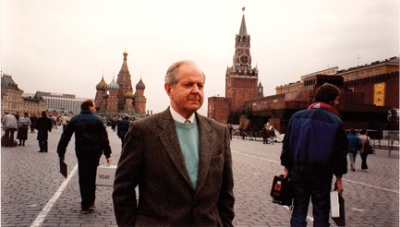Robert Conquest, dead at 98, was a scholar who studied the late and unlamented Soviet Union, but always remained more scholar than Soviet -- which explains why he was denied the rave reviews that were lavished on historians who could be counted on to follow the party line, no matter how many twists and turns and contradictions it went through. For example, he steadfastly refused to make excuses for Comrade Stalin's "excesses" -- a revealing term. As if Stalin had had the right idea basically, but had just gone too far -- to excess. And so had corrupted Lenin's original, idealistic vision of communism.
Robert Conquest never bought into that line, let alone preached it. Far from representing a break with Lenin's beliefs, he explained, Stalinism was the natural continuation of it. The massacres, the prison camps and executions, the suppression of any opinions but that of the ruling class, the dictatorship of the proletariat or at least of those who presumed to speak for it, the terror for terror's sake ... it had all been there from the start, and Stalin's reign was but its natural continuation.
This thorough, patient, conscientious British-American historian documented his case with a mountain of detail, so much that to plow through it volume after volume took remarkable endurance. There is something -- how else to put it? -- boring about atrocities endlessly repeated, plots forever being concocted, the lists of the dead. ... Like all the bloodshed, the prose it took to describe it began to clot and dry. As with Robert Conquest's history, the terrifying became the routine. Familiarity breeds apathy. As in Stalin's Russia.
We are all prisoners of chronology, trapped in the same elevator in time. And we don't have the luxury of choosing our companions for the journey. It was Robert Conquest's fate to share his time here (1917-2015) with some of the great voices of freedom in our day -- the crystal spirit of George Orwell, the Whittaker Chambers who made his witness against communism into poetry and prophecy, the Aleksandr Solzhenitsyn of the monumental yet moving "Gulag Archipelago," the blazing comet that was Christopher Hitchens for all too short a time. ... Robert Conquest encouraged them all, and held his own against them all in the interplay of gossip and humor he never let interfere with his sober histories.
A sci-fi fan, he committed some himself. His poetry tended to come out doggerel, but it was not without a certain vulgar appeal, and always made its political point:
There was a great Marxist called Lenin
Who did two or three million men in.
That's a lot to have done in,
But where he did one in
That grand Marxist Stalin did ten in.
The gulf between Conquest's sober history and his jousts with his friends and contemporaries was just too wide for a single impression of his work to emerge. Not that he didn't collect all the usual distinctions -- a Presidential Medal of Freedom in 2005 and all that -- but his was not an immediately recognizable name like Orwell's or Solzhenitsyn's. Maybe because the left could never forgive him for straying onto honesty, and the right tended to overlook him back there in the shadows where journalism and scholarship intersect.
As for his own political philosophy, Conquest once described himself as a "Burkean conservative." And added: "I'm an anti-extremist. And I'm for a law-and-liberty culture. Those are Orwell's words: law and liberty. I don't regard the (European Union) as being any good for that. I am strongly against the EU. I'm against regulationism and managerialism. I'm against activism of any sort."
Remember, Conquest once noted, that "the Nazis were keen statists, and keen on socialism: 'national socialism,' they called it. And when it comes to 'conservatism' -- whatever that is -- I feel that, when other people and nations are veering from civilization, I would prefer to conserve." If that's not the essence of being a conservative, what is?
Conquest wound up taking refuge at Stanford's Hoover Institution, a kind of museum for voices of reason driven into exile. Alexander Kerensky, the last leader of the Russian provisional government before he was driven out of power, took sanctuary there. Its namesake, Herbert Hoover, was driven into a kind of internal exile after his name was tarred for 20 years following the Great Depression, with its Hoovervilles (shantytowns) and Hoover blankets (old newspapers), and would stay out of public favor till Harry Truman brought the former president back into public service after a couple of decades had passed and memories had faded.
By the time of his death, Robert Conquest had seen his own political reputation take many a turn without his ever changing it. He never apologized for believing in freedom -- and had no reason to.
Comment by clicking here.
Paul Greenberg is the Pulitzer-winning editorial page editor of the Arkansas Democrat-Gazette.





 Contact The Editor
Contact The Editor
 Articles By This Author
Articles By This Author